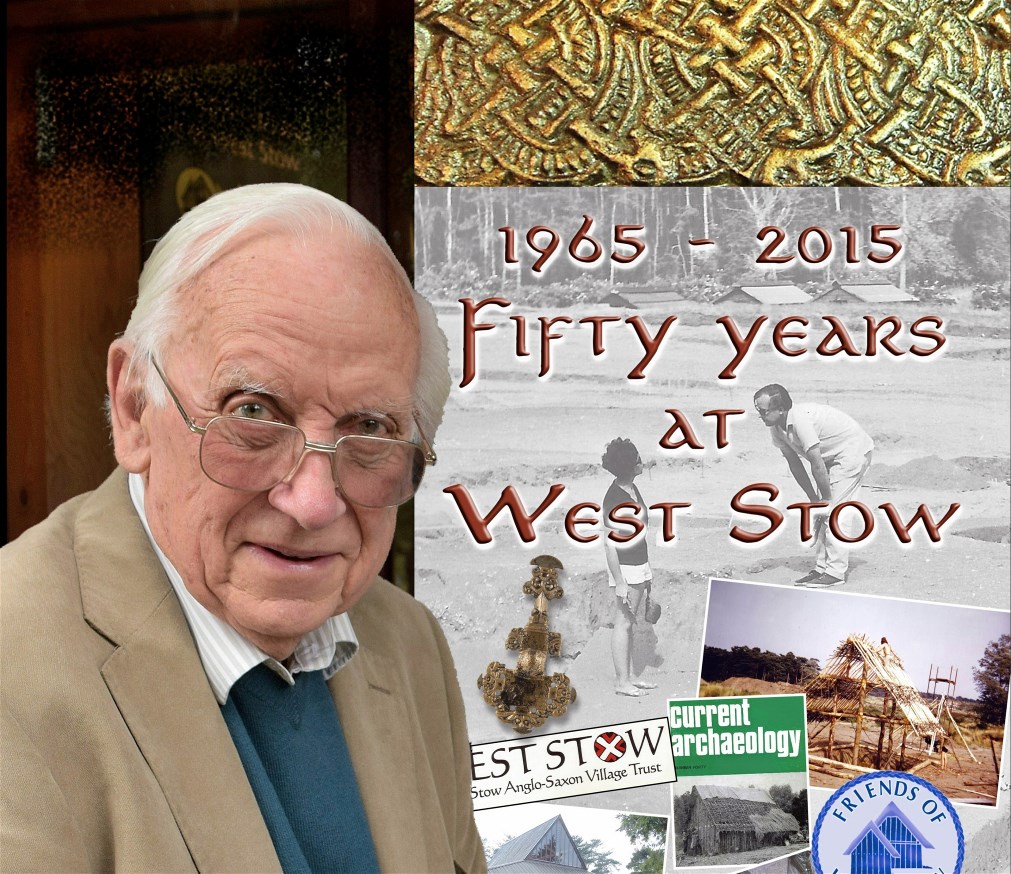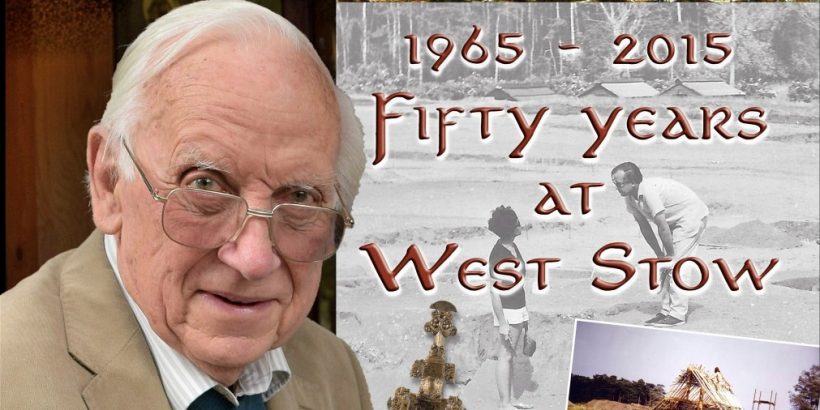The leading archaeologist whose idea for “living, experimental reconstruction of the past” led to the reconstruction of West Stow Anglo-Saxon Village, has died.

Dr Stanley West led the excavation of West Stow between 1965 and 1972 during which time he discovered evidence of much of the original Anglo Saxon wooden buildings that once stood there. The excavations also uncovered thousands of animal bones, iron and bronze objects, even seeds and grain. All of this in turn has furthered knowledge about Anglo-Saxon people and how they once lived.
His idea to recreate the buildings saw a group of Cambridge students, under his guidance, rebuild the first of these Anglo-Saxon homes in the summer of 1973. Their experimental archaeology used Anglo Saxon materials and methods to build an Anglo-Saxon home on the archaeological footprint left behind from the wooden houses. Many of those students reunited to mark the 50 anniversary of the project at West Stow in June last year.
The rebuilding of the Anglo-Saxon Village continued throughout the 1970s, 80s and 90s and in 1999, Dr West together with the Mayor of St Edmundsbury Borough Council, formally opened the new Anglo-Saxon Centre, cafe and shop.
The following year he published his book West Stow Anglo-Saxon Village, “Understanding West Stow” followed by “West Stow Revisited in 2001 which gave a more technical account of the excavations and the reconstructions.
Dr West who was 93, passed away peacefully in his sleep in the early hours of Thursday 7 March.
West Stow Anglo-Saxon Village is managed by West Suffolk Council on behalf of the West Stow Anglo-Saxon Village Trust.
Cllr Ian Shipp, Cabinet Member for Leisure and Culture at West Suffolk Council, said: “West Stow Anglo-Saxon Village welcomes thousands of visitors every year, many of them school children learning about Anglo-Saxons and their way of live. The things we now know, would simply not have been possible if it wasn’t for Dr Stanley West and the excavations at West Stow that he led in the 1960s and early 1970s. It was his vision that led to the gradual recreation of the Anglo-Saxon Village that we see today. Through this he has helped teach and inspire thousands of children and adults alike about this part of our local history and heritage and we are forever grateful for all he did for West Stow and West Suffolk.”
Dr West started his career in 1948 working as an archaeology assistant at Ipswich Museum. After graduating with a degree in archaeology and anthropology in 1959, Dr West worked in Sheffield and then Tanzania until 1965.
He returned to Suffolk and lectured on archaeology to adults at evening classes in Cambridge for ten years until 1975.
In the 1970s he was also pivotal in setting up the county archaeology units in Norfolk and Suffolk. In Suffolk, the archaeology unit became part of the Planning Department and gave it access to be consulted on planning applications including those that were sites of possible archaeological interest. This became planning law in 1990 helping to preserve national heritage. A year later, Dr West, who has been a director of Suffolk County Council’s Archaeological Unit since 1974, retired from that post. His involvement with West Stow Anglo-Saxon continued through to 2004 when he moved to Gloucestershire to be closer to his family.
Keith Wade, who dug with Stanley at West Stow in the late 1960s, was appointed by Stanley as Urban Field Officer in the Suffolk Archaeological Unit at its inception in 1974 and took over as County Archaeologist in 1991 following Stanley’s retirement.
He said: “The team of archaeologists which he assembled in 1974 were looking forward to celebrating the 50th birthday of the service this April and it’s a great disappointment that he won’t be able to join us. He didn’t move to the West Country immediately on retirement and I still saw him as a member of the East Anglian Archaeology Editorial Committee whose meetings were held at his house in Finningham. He will always be remembered as the creator of Suffolk’ County Council’s professional archaeological service which continues to thrive.”
Dr Catherine Hills who also worked with Dr West said: “Few such sites had been excavated on any scale before West Stow, none to modern standards of excavation, while the numerous examples discovered since always refer back to West Stow.”
“Stanley was supportive to younger colleagues, and I owe him a considerable debt myself. I came to excavate at West Stow in 1969 and stayed for the two following seasons.
“When, in 1972, the project was set up by Peter Wade Martins to excavate the Anglo-Saxon cemetery at Spong Hill, North Elmham, Norfolk, Stanley suggested me as a good person to work on the finds from that site. That became my PhD topic and the basis for my academic career, which I therefore partly owe to Stanley.
“Later I was on the academic committee at West Stow, set up by Stanley to maintain the archaeological experimental side of what has also become a successful educational and public organisation.
“Stanley had a dry sense of humour, warmth and integrity as well as a depth of knowledge of the archaeology of East Anglia. He will be missed by many of us.”
His son Marcus said: “Stanley was a much-loved husband to Irene, father, grandfather and friend. His enthusiasm for life and knowledge, with an enquiring and dynamic mind, has certainly been passed on and will continue to influence and inspire us. “

